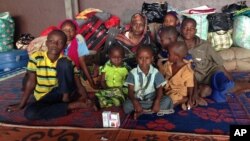JOHANNESBURG —
The medical aid group Doctors Without Borders -- known by its French acronym MSF -- has launched an appeal in South Africa to raise $50,000 for its operations in the Central African Republic (CAR). The campaign -- called #ActForCAR -- says the funds are urgently needed to help some of the 1 million Central Africans displaced over the past 15 months.
Speaking at the launch of the MSF fundraising drive in Johannesburg on Wednesday, South African psychologist Gail Wormersley said thousands of displaced people in the CAR are living in human misery and terror.
She appealed to South Africans to urgently donate at least $50,000 for water purification, malaria treatment, food supplements for children and general medical care.
Wormersley, who spent six weeks in the CAR providing psychological counseling to patients and MSF staff, described the mood of the victims as dominated by hopelessness.
“What I saw is people who have been exposed to such high levels of conflict and of trauma, almost reached a stage where they stop feeling, it’s a stage of feeling absolutely overwhelmed and powerless in the face of the situation and a level of despair," explained Wormersley. "Where people almost want to say, "Let me give up, I can’t handle this situation.'"
South African TV personality and businessman Masego Maponya was also on hand and asked South Africans to do their part in saving lives.
“We’re here today to really call to action and appeal to the public to try and raise this 500,000 rand because we feel that it’s reachable. If you think about it, it’s 50 rand from 10,000 people and every single cent really, really counts, no matter how much anyone contributes.” Maponya stated.
The crisis in the CAR began a year ago when the mostly Muslim Seleka rebels overthrew the president and launched a wave of killing and looting -- provoking a backlash from mostly Christian militias known as the anti-balaka.
At least one quarter of the country’s 4.6 million people have been displaced and are in need of urgent medical care both inside the country and in refugee camps in neighboring Chad and Cameroon.
Wormersley said every month MSF medical staff provides nearly 30,000 consultations but that is not enough.
“All South Africans have a role that they can play, be it giving 50 rand to the appeal. A 100 rand can provide 200,000 liters of safe drinking water. Five hundred rand gives us enough medical equipment to care for the mothers who have to deliver babies safely under these incredibly stressful situations,” said Wormersley.
South Africa - the economic powerhouse on the continent - was among the first to respond to the growing CAR crisis in 2013. It dispatched several hundred soldiers only to withdraw shortly after when 13 were killed and nearly 30 badly injured during the Seleka-backed coup.
MSF hopes South Africans feel solidarity through loss and contribute.
Speaking at the launch of the MSF fundraising drive in Johannesburg on Wednesday, South African psychologist Gail Wormersley said thousands of displaced people in the CAR are living in human misery and terror.
She appealed to South Africans to urgently donate at least $50,000 for water purification, malaria treatment, food supplements for children and general medical care.
Wormersley, who spent six weeks in the CAR providing psychological counseling to patients and MSF staff, described the mood of the victims as dominated by hopelessness.
“What I saw is people who have been exposed to such high levels of conflict and of trauma, almost reached a stage where they stop feeling, it’s a stage of feeling absolutely overwhelmed and powerless in the face of the situation and a level of despair," explained Wormersley. "Where people almost want to say, "Let me give up, I can’t handle this situation.'"
South African TV personality and businessman Masego Maponya was also on hand and asked South Africans to do their part in saving lives.
“We’re here today to really call to action and appeal to the public to try and raise this 500,000 rand because we feel that it’s reachable. If you think about it, it’s 50 rand from 10,000 people and every single cent really, really counts, no matter how much anyone contributes.” Maponya stated.
The crisis in the CAR began a year ago when the mostly Muslim Seleka rebels overthrew the president and launched a wave of killing and looting -- provoking a backlash from mostly Christian militias known as the anti-balaka.
At least one quarter of the country’s 4.6 million people have been displaced and are in need of urgent medical care both inside the country and in refugee camps in neighboring Chad and Cameroon.
Wormersley said every month MSF medical staff provides nearly 30,000 consultations but that is not enough.
“All South Africans have a role that they can play, be it giving 50 rand to the appeal. A 100 rand can provide 200,000 liters of safe drinking water. Five hundred rand gives us enough medical equipment to care for the mothers who have to deliver babies safely under these incredibly stressful situations,” said Wormersley.
South Africa - the economic powerhouse on the continent - was among the first to respond to the growing CAR crisis in 2013. It dispatched several hundred soldiers only to withdraw shortly after when 13 were killed and nearly 30 badly injured during the Seleka-backed coup.
MSF hopes South Africans feel solidarity through loss and contribute.




